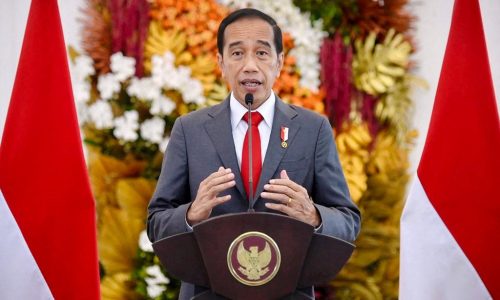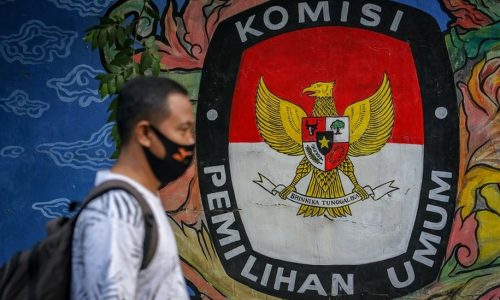In relation to the recently uncovered illegal nickel ore exports, sparked by the circulation of a document analysis from the Corruption Eradication Commission (KPK), the government and the anti-corruption agency appear to be in disagreement over how to address this illicit activity.
The government officially prohibited nickel ore exports on January 1, 2020, through the Minister of Energy and Mineral Resources Regulation No. 11/2019.
This prohibition is part of President Joko Widodo’s (Jokowi) administration policy, which emphasizes downstream processing. The goal is to transform Indonesia from an exporter of raw materials into a producer of value-added goods for the economy.
However, the KPK document reveals a contrary situation. Nickel ore exports have continued to flow out of the country, mainly to China, with a considerable amount.
According to the document, around 5 million tons of nickel ore, all recorded under the Harmonized System code HS 26040000, were exported to China.
The KPK document contains information on suspicious nickel ore export activities from Indonesia to China. Nickel ore is a raw material used in processing nickel-based products such as ferronickel, nickel matte, and NPI. Prior to 2020, Indonesia was allowed to export nickel ore freely.
The government claims that during the approximately 2.5-year moratorium on nickel ore exports, national revenue has significantly increased. Additionally, the value of downstream processing reached US$33.81 billion or IDR 504.2 trillion (based on the exchange rate of IDR 14,915 per US$) in 2022, a remarkable 745% increase compared to the export value in 2017.
Originally, the KPK asserted that the millions of tons of nickel ore flowing to the Chinese market were part of illegal activities. However, the HS code registration by Chinese customs authorities indicates that mining commodity exports and imports to China are conducted legally.
The KPK’s analysis document revealed that nickel ore exports continued to flow during the 2020 to 2022 period. Businesses have cross-checked KPK data by directly accessing the official website of the General Administrations of Customs of the Republic of China (GACC). The results indicate that nickel ore imports from Indonesia to China have consistently flooded the Chinese market.
For example, in 2020, the first year of the nickel ore export ban, the GACC recorded that China imported 3.39 million tons of nickel ore from Indonesia, valued at US$193.3 million. In 2021, the import quantity decreased to 839,161.2 tons, worth US$48.14 million. However, imports increased again in 2022 to 1.08 million tons, worth US$54.63 million.
Up until June 2023, China imported 245,823 tons of nickel ore, valued at approximately US$11.6 million. The total export-import of nickel ore from 2020 to mid-2023 amounted to 5.31 million tons, valued at US$307.8 million or around Rp4.6 trillion (based on an exchange rate of 15,000 per US$).
Allegedly flowing from Sulawesi and North Maluku
The flow of nickel ore is suspected to originate from companies operating in the Bonded Zones (KB) in Southeast Sulawesi. Additionally, there are indications of illegal imports from Indonesia to China originating from the North Maluku region.
Sulawesi and North Maluku, particularly Halmahera, are known as nickel mining areas in Indonesia. Numerous players, including Chinese companies, are involved in nickel mining in these regions.
Data from the Investment Coordinating Board (BKPM) reveals that China was the second-largest investor in Indonesia between 2018 and the first quarter of 2023, with a total investment of US$24.55 billion.
China’s investments in Indonesia are primarily dominated by the basic metal industry, amounting to US$8.61 billion, followed by transportation, warehousing, and telecommunications at US$6.69 billion, electricity, gas, and water at US$2.75 billion, real estate, industrial estates, and offices at US$1.74 billion, and the chemical industry at US$1.95 billion.
Possible weak spots
Recently, the National Strategy Coordinator for Corruption Prevention (Stranas PK), Pahala Nainggolan, mentioned two potential issues related to nickel ore exports to China.
Firstly, he pointed out weaknesses in the KPK’s supervision of nickel surveyor agencies. As a result, the anti-corruption agency is looking more closely at the performance and management of these surveyor agencies involved in commodity trade.
He explained that there could be instances where the surveyor misidentifies the nickel content of the ore, possibly labeling it as iron sand without mentioning the presence of nickel. Although such occurrences may be relatively limited in scope, they could occur in certain surveyor areas and when reaching the recipients in China.
Secondly, Pahala highlighted the differences in nickel content definitions between Indonesia and China. These variations in the classification of nickel ore may lead to discrepancies in the HS code assignment for nickel ore in China compared to Indonesia’s export data.
He exemplified that what Indonesia classifies as iron sand, with a nickel content below 0.17, may be classified as nickel in China if its nickel content is below 0.05. Consequently, ore with a 0.12 nickel content exported to China could be labeled as iron sand, while it is classified as nickel in Indonesia.
This second statement from Pahala aligns with information provided by several Customs officials. They gathered information from Customs authorities and coordinated with Chinese Customs to ascertain the origin of the unusual exportations.
The investigation raised suspicions that the goods exported and recorded in China as nickel ore were, in fact, iron ore. Allegedly, China has a rule that iron ore with a nickel content of 0.05 would be classified as nickel ore. As a result, there could be discrepancies in the classification codes used in China and Indonesia.
Data from the Central Bureau of Statistics (BPS) shows that the total export of HS 26011110 (iron ore and concentrates) to China from 2020 to 2022 amounted to only 19.2 tons, valued at US$796,964. The export process occurred from Ternate, North Maluku.
In contrast, the export of goods under HS 26011190, including iron ore and concentrates, reached 5.73 million tons. However, according to BPS data, before 2022, HS 26011190 was used to classify “other hematite” and concentrates, and the specific inclusion of “iron ore” and “concentrates” in this HS code was only introduced in 2022.










